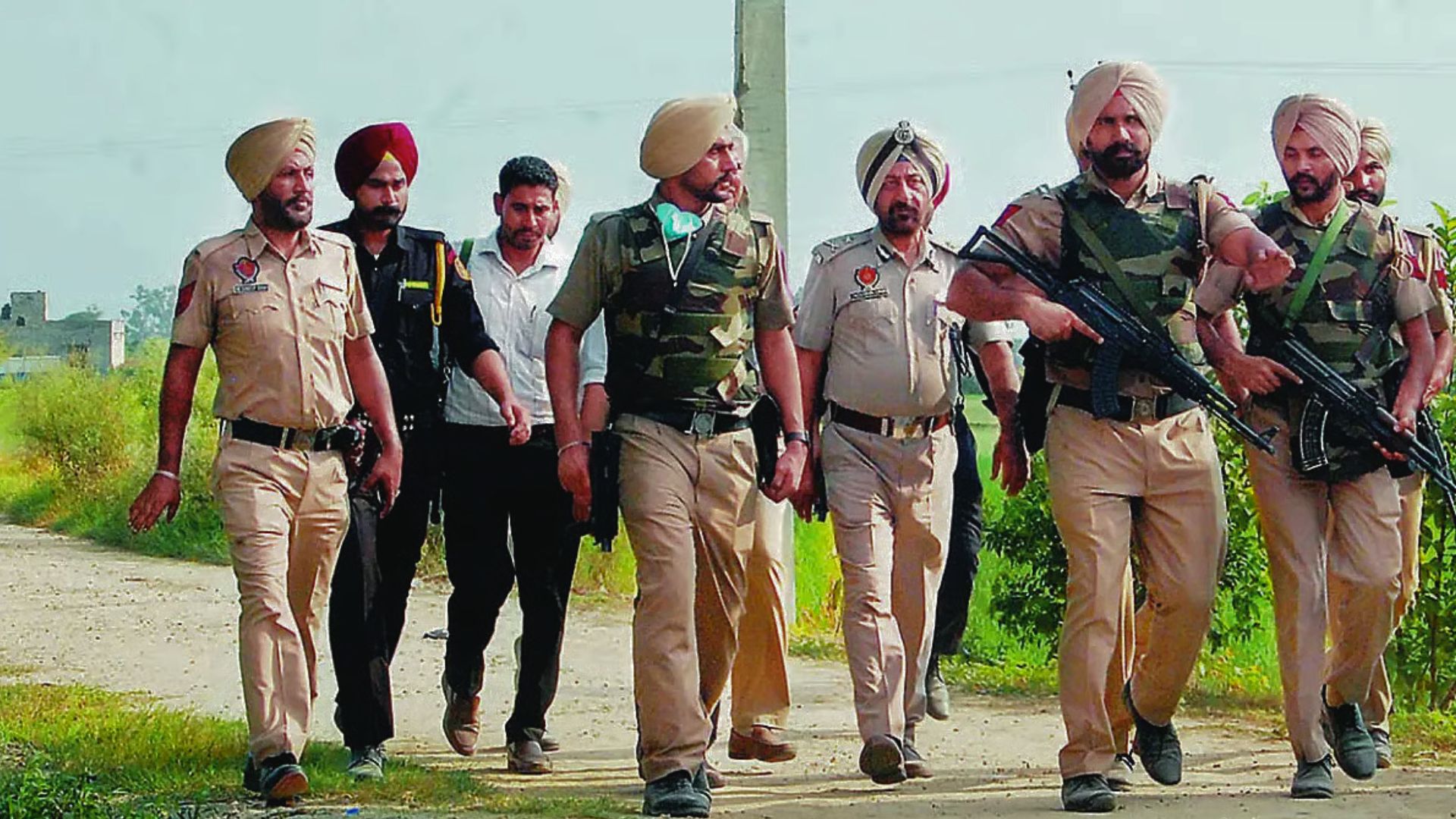Trump Says India will Face 25% Tariff Plus Penalty for Trading with Russia
Panjab: Trump tariff hits exporters; 5 cops get life sentence; Farmers rally against Land Pooling; Virus & pest threaten crops. Sikh: GNDU VC in cross hairs; Rajasthan clarifies on Kirpan; Haryana amends Gurdwara Act; Khalsa College museum digitized—and more stories.

Trump Says India will Face 25% Tariff Plus Penalty for Trading with Russia
US President Donald Trump on 30 Jul said that India will pay a tariff of 25% beginning 1 Aug in addition to a penalty for what he views as unfair trade policies and for India’s purchase of military equipment and energy from Russia. In April 2025, Trump had said the tariff would be 26%. On 31 Jul, Trump wrote on Truth Social, ‘I don’t care what India does with Russia. They can take their dead economies down together, for all I care.’ This is a damning statement for India which claims it is on its way to becoming the world’s third largest economy. The point of contention is India’s trade in Russian oil during the Russia-Ukraine conflict since 24 Feb 2022. On 4 Aug, Trump said, 'India is not only buying massive amounts of Russian Oil...selling it on the Open Market for big profits.' In June 2022, at the Globsec 2022 conference India’s External Affairs Minister Subrahmanyam Jaishankar stoutly defended India’s position, as he did in Feb 2024. However, the defence was about benefitting from opportunity, but not rooted in either ideological clarity or a moral stance. On 4 Aug, India replied that the European Union and US also continue to trade with Europe. In the last few months, the talks between the US and India have not gone very well because India is resisting the US demand to open its agricultural and dairy markets. US Treasury Secretary Scott Bessent said the trade negotiation team was 'frustrated' with India. The final announcement will be on 7 Aug but the tariff will be effective from 31 Jul night. The tariffs will target sectors like auto components, steel, aluminum, smartphones, gems, and jewellery. The tariff has come as a huge setback to textile and hand tool industry in Panjab. Trump has brought down Pakistan's tariff from 29% to 19% and Bangladesh's to 20% from 35%. In addition, Trump announced the US will develop ‘massive’ oil reserves in Pakistan (earlier coverage).
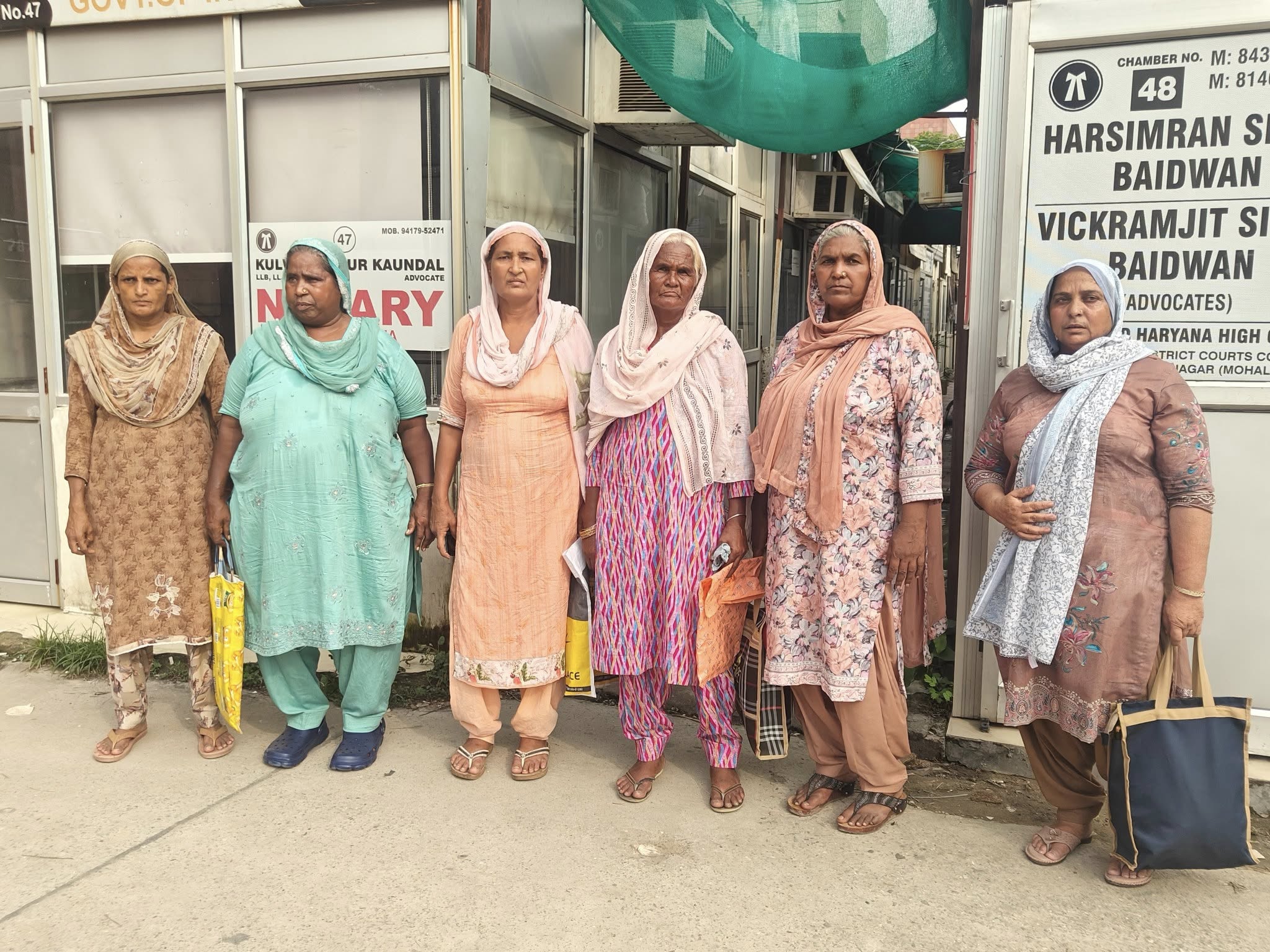
5 Cops Given Life Sentence for 1993 Encounter Killing; New Judges Sworn In
A Central Bureau of Investigation court in Sahibzada Ajit Singh Nagar has sentenced five retired Panjab Police officers to life imprisonment in a 32-year-old case of two fake encounters of seven men from Tarn Taran. Former Bathinda Senior Superintendent of Police Bhupinderjit Singh, former Deputy Superintendent of Police Devinder Singh, former Inspector Suba Singh, and former Assistant Sub Inspectors Gulbarg Singh and Raghubir Singh were also fined USD 4K each for criminal conspiracy, murder, destruction of evidence, and forgery. The fine will be given to the families of the deceased as compensation. The accused were found guilty of staging two encounters in July 1993, where the victims, including three Special Police Officers Shinder Singh, Desa Singh, Sukhdev Singh, and a civilian Balkar Singh were illegally picked up from Rani Walla village, tortured and then shown as killed in encounters. In another case, three more abducted persons Mangal Singh, Sarabjit Singh, and Harvinder Singh were killed in an encounter. Meanwhile, ten District and Sessions Judges were sworn in on 4 Aug as Additional Judges of the Punjab and Haryana High Court (PHHC), taking the court’s working strength to 59 against the sanctioned strength of 85. The appointments are part of a push to reduce a pendency of 4,33,720 cases. Concurrently, more than 82% of prisoners in Panjab’s jails are undertrials, with inmates behind bars for years without their trials concluding. Data compiled till 20 May shows that 30,339 of 36,846 inmates are undertrial prisoners, while only 6,457 are convicts. Men form the bulk of undertrials at 28,817, with 1,520 women and two transgender persons. One cause for delay in disposing cases is scarcity of judges, another is the habitual absence of police officers summoned as witnesses, especially in drug cases. The PHHC has repeatedly condemned this pattern, terming it as 'blatant disregard for judicial authority.' Amid this crisis, the Punjab State Legal Services Authority (PULSA) has launched Mission Mode Punjab to assist unrepresented prisoners. Of 460 identified cases, PULSA has filed criminal appeals in 406 for convicts lacking legal aid (earlier coverage).
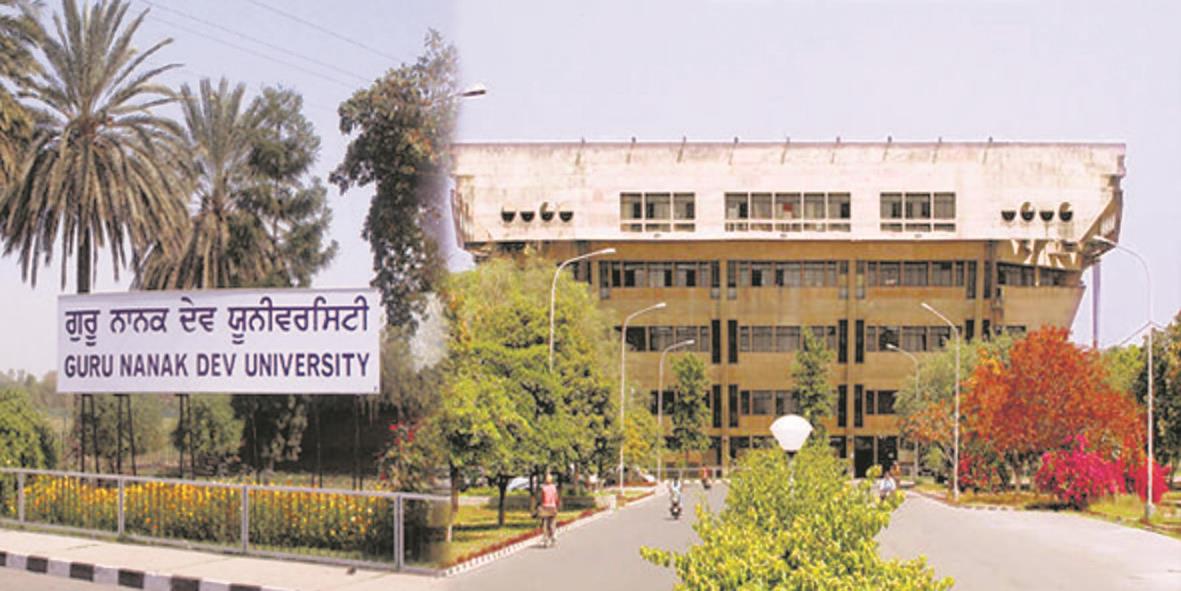
GNDU VC in Cross Hairs Over Brief to RSS Chief; Rajasthan Clarifies on 'Kirpan'
On 1 Aug, a video went viral in which the Vice Chancellor (VC) of Guru Nanak Dev University (GNDU) Dr. Karamjeet Singh could be seen addressing Rashtriya Swayamsevak Sangh (RSS) chief Mohan Bhagwat during an education conference on 28 Jul. The seminar was conducted by Gyan Sabha (Knowledge Session)—Education for Viksit Bharat (Developed India), an event organized by RSS-linked Shiksha Sanskriti Utthan Nyas (Endowment for Lifting Education and Culture) and Amrita University at Kochi, Kerala. The event focused on the role of education in building a developed India. In the video Dr. Karamjeet informs Bhagwat about initiatives at GNDU, including the introduction of a compulsory PhD course on Bharatiya parampara (Indian tradition) and the establishment of a Sikh Chair aimed at studying the connections between the Rigveda and the teachings of Sikhi founder Guru Nanak. Indian National Congress Member of Panjab Legislative Assembly Pargat Singh tweeted: ‘it shows how the Aam Aadmi Party (AAP) government in Panjab has helped the RSS take control of the entire education system, including universities, in Punjab.' The Shiromani Gurdwara Parbandhak Committee (SGPC) has taken note of Dr. Karamjeet briefing the RSS chief and has removed Dr. Karamjit from the committee formed to review the service rules of the Jathedar (leader) of Sri Akal Takht Sahib (Eternal Throne, AT). Though not explicitly stated, the reason for removal could be AT’s 2004 Hukamnama (edict) to not support the RSS. Meanwhile, after stopping an Amritdhari (initiated) Sikh woman candidate from appearing in the Rajasthan High Court (Jodhpur) Civil Judge recruitment exam in Jaipur, now the Rajasthan govt has clarified that ‘Sikh religious symbols are permitted during exams.' Citing a December 2019 circular issued by former Indian National Congress government under Ashok Gehlot, the Bhajan Lal Sharma govt issued a statement that 'the candidates of Sikh religion should be allowed to appear in the examination wearing religious symbols like Kada, Kirpan and Pagdi etc. in various competitive examinations conducted’ by Rajasthan govt institutions (earlier coverage).
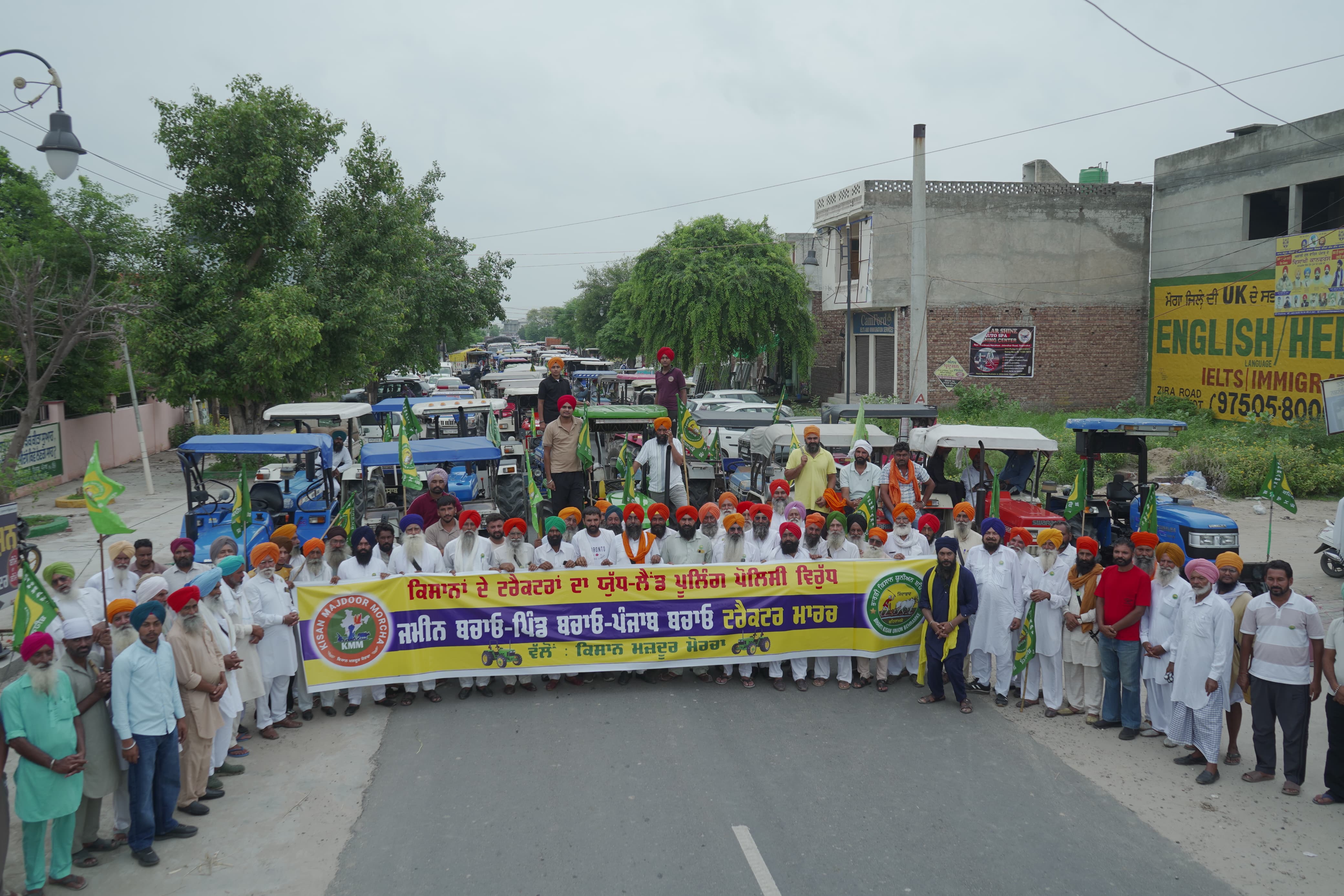
Farmers Rally Against Land Pooling, Govt to Stagger Scheme
On 30 Jul, thousands of farmers across Panjab participated in a massive tractor rally against the state government’s contentious land pooling policy. The protest, led by the state unit of the Samyukt Kisan Morcha (SKM) and supported by several other farmer unions, including the Kisan Mazdoor Morcha and SKM (non-political), marked a rare moment of complete unity across all farmers’ forums. Long convoys of tractors rolled out on Ferozepur Road, Grand Trunk Road, and the highways in Bathinda and Mansa, covering nearly 164 villages that fall under the policy which aims to pool over 65K acres of land. The protest was most intense in Ludhiana, Amritsar, Ferozepur, Moga, Patiala, Mohali, and Jalandhar, where farmers said their very existence was under threat. Women rallied at their villages and defended their lands. Increasingly, residents, activists, and even political leaders are pointing to several Punjab Urban Development Authority-approved projects that have either failed to attract buyers or remain stalled for over two decades. When the govt tried to showcase a few who have consented to part with their lands, the farmers fact-checked them and pointed out they are either relatives of members of the ruling Aam Aadmi Party or industrialists, real estate developers, and not farmers. Data from the Housing Department shows that in the last 25 years only 10,967 acres have been acquired by different development authorities. Of these, nearly 8K acres have been developed, rest are not. Earlier acquired lands have also gone into private hands. The Panjab govt has now decided to stagger the land acquisition. In Ludhiana district, it is acquiring only 6K acres by the year-end. The smaller towns would be spared for now. Farmers have also filed a case at the Punjab and Haryana High Court. The petitioners argue the Land Pooling Policy is contrary to the Indian Constitution's mandate of Right to Fair Compensation and Transparency in Land Acquisition, Rehabilitation and Resettlement Act, 2013.
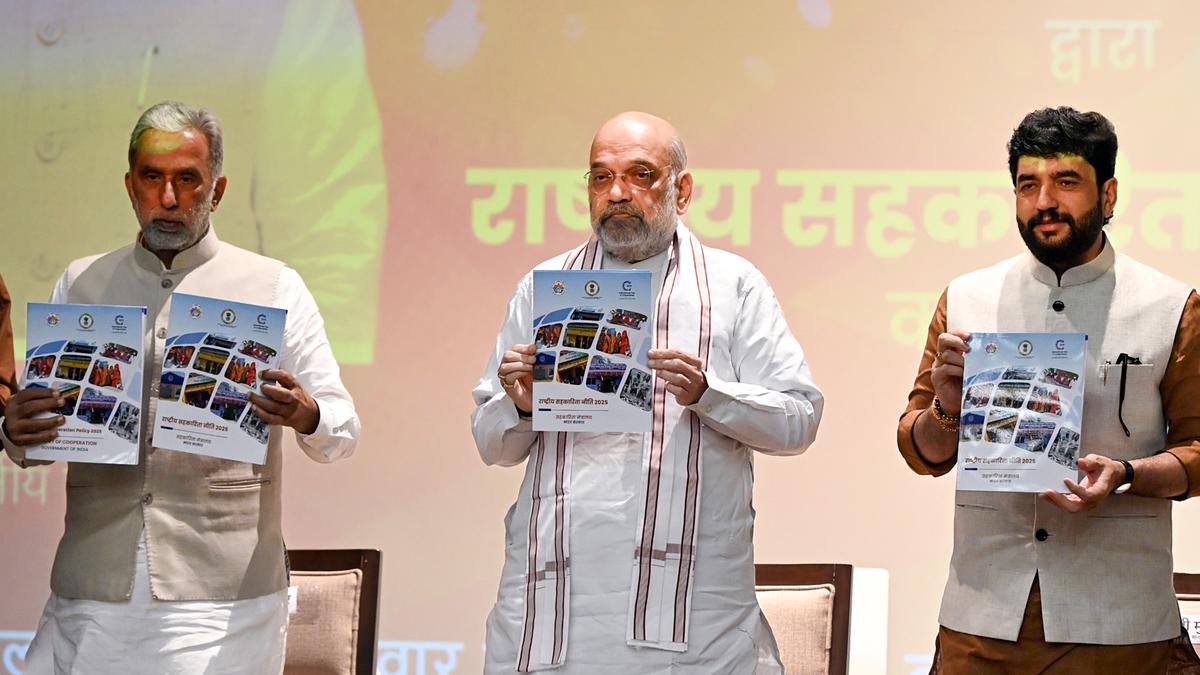
Virus & Pest Threaten Paddy Plus Cotton; SKM Opposes National Cooperation Policy
At a time when Panjab’s paddy fields should be flourishing in the humidity of the monsoon season, farmers in six districts are vigilant as the Southern Rice Black-Streaked Dwarf Virus (SRBSDV) has hit Haryana for the third consecutive year. Experts from Punjab Agricultural University have issued an advisory urging timely vigilance, thorough inspections and immediate reporting of suspicious symptoms. The SRBSDV, transmitted by the White-Backed Plant Hopper leads to narrow upright leaves, poor root development, reduced plant height—often to one-third the normal size—and eventual withering of the crop. Also, after several years, the Green Leafhopper has returned to cotton fields across north India in unexpectedly high numbers. It has damaged crops at several places and has triggered concern among farmers. Experts attribute the sudden surge in Leafhopper population to favorable weather conditions—above-average rainfall, persistent humidity, an increase in rainy days, and continuous cloud cover. Meanwhile, the Indian Union Home and Cooperation Minister Amit Shah, has recently proposed the National Cooperation Policy (NCP) 2025. The policy gives expansive jurisdiction to the new Cooperation Ministry to design framing policy, coordinate cooperation across sectors and states, and to train personnel of cooperative departments and institutions. The Samyukt Kisan Morcha (SKM) has opposed NCP saying it violates the federal structure of the Indian Constitution by attempting to centralize control over cooperative societies, a domain that constitutionally belongs to the states. SKM alleges that the NCP 2025 lacks vision to protect the rights and livelihoods of farmers, workers, and marginalized communities and is instead a backdoor mechanism to facilitate the entry of corporations into agriculture. SKM has called for a nationwide protest on 13 Aug under the banner Corporations Quit India and appealed to all political parties and state governments to join the protest to oppose the policy.
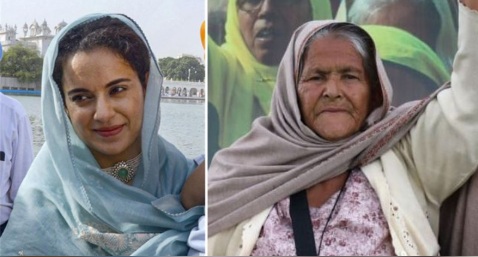
SCI Dismisses Panjab’s Plea on Water; PHHC Dismisses Kangana’s Defamation Plea
The Supreme Court of India (SCI) has dismissed the Panjab government's petition against the Punjab and Haryana High Court’s (PHHC) order requiring it to abide by the 2 May decision to release 4.5K cusecs of extra water to Haryana. Meanwhile, Panjab has sent a USD 12M bill to Haryana for operations and maintenance of the Bhakra canal as part of an effort to recover dues owed by the Bhakra Beas Management Board (BBMB) partner states. Concurrently, despite stiff opposition from Panjab, the BBMB has cleared the path for deployment of the Central Industrial Security Force (CISF) at Bhakra Dam. BBMB has deposited USD 1M with the Union Ministry for Home for deployment of the force. Panjab has conveyed to the BBMB management that it would not pay anything for the deployment of CISF. In news related to Farmers Protest 1.0 (2020-21), PHHC has dismissed a petition filed by actor-turned-politician Kangana Ranaut for quashing a defamation complaint against her by Mahinder Kaur, an Bathinda-based elderly protester. During Farmers Protest 1.0 (2020-21) Kangana had slandered Kaur saying, 'Ha ha ha she is the same dadi (grandmother) who featured in Time magazine…she is available in 100 rupees.' Kangana had mistaken Kaur for the anti-Citizen Amendment Bill activist Bilkis Bano from Delhi’s Shaheen Bagh protest. However, the farm law protesters had taken the jibe personally saying Kaur was a mother figure to them and rallied against Kangana for being self-appointed a Bharatiya Janata Party spokesperson who were trolling the protesters as ‘anti-national and separatists.’ PHHC has also asked the union govt and Chandigarh administration to respond to a petition filed by farmers over a delay in the Union Territory sending a no-objection communication for withdrawal of cases registered during the Farmers Protest 1.0. The union govt issued a policy in 2021 which said upon receiving no-objection from the state, the cases against the farmers registered during the farmer agitation would be withdrawn (earlier coverage).

Oxygen Disruption Causes Deaths; Covid-19 Plants Non-Functional
On 28 Jul, three patients admitted in the trauma ward of the Civil Hospital in Jalandhar, who were on ventilator support, died within a span of 35 minutes when the oxygen supply stopped. The deceased included a snakebite victim, a youth who had taken an overdose of drugs and a tuberculosis patient. Panjab Health Systems Corporation director Dr. Anil Goel said that there was a glitch in the oxygen supply plant for 25-30 minutes. Panjab Health Minister Balbir Singh said although the hospital had four sources of oxygen, poor management led to the deaths. He added, ‘The Medical Superintendent of the hospital, Dr. Raj Kumar, Senior Medical Officer Dr. Surjit Singh, Consultant Anaesthetist Dr. Sunakshi are being placed under suspension. House Surgeon Dr. Shivinder Singh is being dismissed from service.’ The incident has revealed a larger gap in Panjab's health system. More than three years after Panjab rushed to install oxygen generation plants in response to the Covid-19 crisis, 35 oxygen plants are currently non-functional. The Health Minister has repeatedly referred to oxygen plants as 'white elephants', citing high maintenance costs and low utilization as key concerns. It is ironic that the Aam Aadmi Party (AAP) came to power in Panjab on the planks of health and education, now calls key health infrastructure a ‘white elephant’. Meanwhile, data compiled by the Punjab Civil Medical Services (PCMS) Association shows at least 60 incidents of violence 'endangering the lives of doctors and other healthcare staff' in the past year. Doctors are demanding adequate security arrangements. PCMS Association reminded the Health Secretary that the AAP-led state government is yet to fulfill its promise of deploying security personnel at govt health facilities on 19 Aug 2024. Doctors expect the promise will now be fulfilled by 19 Aug this year.' Concurrently, according to data shared by the Union Health Ministry in Parliament, Panjab has emerged as a significant contributor to the national thalassemia burden, accounting for nearly 6% of all registered cases across the country in 2025.
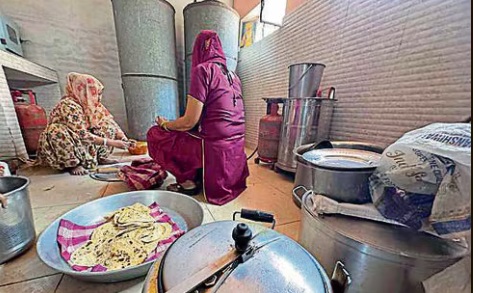
'War Against Drugs' Comes to Schools; Mid-Day Meal Workers Not Paid
Panjab Chief Minister Bhagwant Singh Mann and Aam Aadmi Party (AAP) national convener Arvind Kejriwal unveiled the anti-drug curriculum to be introduced in schools under War Against Drugs campaign with an aim to make 800K students aware about the menace of drugs at village Arinvala, Fazilka. Addressing the gathering, the AAP chief said a special syllabus is being introduced in all government schools for students from classes 9 to 12. School Education Minister Harjot Singh Bains said the curriculum will cover 3,658 schools and 6,500 trained teachers will deliver the program which has been developed in collaboration with Nobel Laureate Prof. Abhijit Banerjee’s J-PAL South Asia. It aims to equip students with the skills to avoid drug use and make informed decisions. The 27-week program consists of 35-minute interactive sessions held every two weeks. It uses documentaries, quizzes, posters, and group activities to bust myths, address peer pressure, and promote better decision-making strategies. Meanwhile, since 1 Jun, a total of 44,301 mid-day meal workers in schools have been unable to withdraw their monthly stipend of USD 34 following the Panjab govt’s decision to change their bank from State Bank of India, Punjab National Bank, and Punjab and Sind Bank to only Canara Bank. Trade unions have termed this decision as 'bizarre and inexplicable'. While educating students is a good step, a bureaucratic reason to deny the workers their due but very low stipend demonstrates the govt apathy. Even on War Against Drugs, on 23 Jul, eight drug addicts escaped from a govt-run de-addiction center in Panjab’s Sangrur district after reportedly attacking a policeman and a nurse with steel plates during dinner time. The policeman, Malkeet Singh, was injured and is undergoing treatment at a hospital. He said, 'I was attacked on the neck, and they tried to strangle me, due to which I became unconscious. Many inmates tried to flee, but the staff managed to control some. A few still managed to escape (earlier coverage).
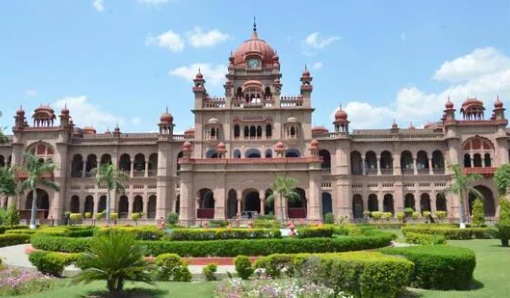
Haryana Amends 'Gurdwara Act'; Khalsa College Amritsar Collections Digitized
On 2 Aug, the Haryana state Cabinet approved amendments to the Haryana Sikh Gurdwaras (Management) Act, 2014. The revised law vests wide-ranging powers in a Judicial Commission, which will now oversee critical matters, including property disputes, committee governance, and service issues. According to the amendment, Section 17(2)(c)—which previously allowed the Gurdwara committee to remove its members—has been removed. The authority to remove or suspend members on grounds of misconduct will now lie with the Judicial Commission under the revised Section 46. The newly reconstituted Judicial Commission will have exclusive jurisdiction over issues such as voter eligibility, disqualifications, service matters of gurdwara employees, and selection and appointments in Gurdwara committees. To support its enhanced role, new Sections 46A to 46N have been introduced, conferring the Commission powers equivalent to a civil court (46B), barring jurisdiction of regular courts (46C), and protecting members from liability for acts done in good faith (46D). Commission orders will be enforceable like civil court decrees (46G), and its members will be deemed public servants (46F). The amendment also outlines a structured process for declaring and managing Sikh Gurdwaras under newly inserted Sections 55 to 55N. Gurdwaras will be classified into three types — Historical (Schedule I), Notified (Schedule II), with annual income of USD 23K or more, and Local (Schedule III). Meanwhile, in Panjab, the 90-year-old Sikh History Research Centre and Museum at Khalsa College, Amritsar which houses rare books, manuscripts and hand-written documents has been digitalized. The collection includes more than 6,274 books which include rare books in English and Panjabi dating back to 16th and 17th century. Experts Ahmad Ali and Sajjan Singh from Salarjung Museum, Hyderabad and their team took over one year's time to painstakingly digitalize and preserve the rare materials. 'The preservation work is almost complete and the galleries to display the material are being given the final shape,' said Khalsa College principal Dr. Mehal Singh. Apart from the library there are weapons belonging to the times of Khalsa Army and other Sikh Wars, besides old coins from the time of Maharaja Ranjit Singh (1801-1839) (earlier coverage).
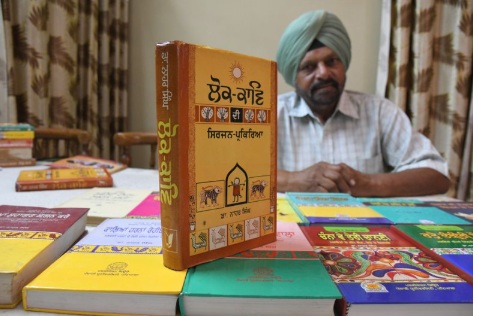
Custodian of Folk Songs
For close to 50 years, Prof. Nahar Singh, who retired from Panjab University’s Punjabi Department in 2012, quietly carried out the monumental work of preserving the cultural soul of a Panjab in transition through its folk songs. Over the years, he and his students have journeyed from village to village in the Malwa region, listening to the voices of rural men and women, and carefully recording their songs, stories, and traditions. Studying at Chandigarh’s DAV College in 1975, Nahar Singh had little interest in folk songs. Coming from the radical left Punjab Students Union, growing up in those heady times, he was more inclined towards literature—criticism and theory. His teacher Kesar Singh wanted him to go and work among ‘people’, real people who dwelled away from the world of books. He wanted him to explore the songs they sang. Still not much interested in fieldwork, he decided to undertake a formal study of Malwa’s folk forms. The field trip uncorked his mind, demolished preconceived notions. In a Panjab rapidly changing under the blitzkrieg of the Green Revolution, the penetration of capital was redefining social relations. The village which had a certain tribal instinct, a value system, an interdependence, was exploding at an unprecedented pace. 'As you move away from the traditional cultural pattern of the traditional life of a traditional village, you call it development, but it haunts us,' he says. Nahar realized he was in the midst of studying and documenting this cultural transformation of Panjab through its songs. He was hearing the rhythm ebb, perhaps listening to some songs one last time before they were to be lost in modernity. People sang songs of love, separation, toil, happiness, sadness, playfulness, harvest, rivers, wars, weddings, funerals. This is when he began to explore the deeper meanings in folk songs, churning out volume after volume of folk songs and analyzing these songs to give a cultural anthropological view of the Panjab of those times. That is what makes his contribution to Panjabi folklore immeasurable and invaluable (earlier coverage).
Notes
Updates
- IN: Sikh who transformed Lucknow from rank 41 to top 3 in cleanliness.
- US-IN: 1,703 Indians deported from US with 6 unknowns on list, highest from Panjab (earlier coverage).
- IN-US: Indian Ministry of External Affairs denies clearance to Panjab Minister for US visit; fourth AAP leader to be denied foreign travel approval.
Suggested Reading (opinions are author’s own)
Harish Damodaran in The Indian Express: India’s pesticide market is changing.
34 Encounters in 3 Months in Panjab; Policemen Found Dead
Panjab: 34 encounters in 3 months; Police assaults farmers; Agri push For pulses and oilseeds. Sikh: SCOTUS accepts Gupta’s plea; Canada wants Nijjar case evidence withheld; Giani Raghbir accuses Badal family of patronizing corrupt elements in SGPC—and other stories.
Gupta Pleads Guilty, Punctures India’s Foreign & Home Ministry’s Long Denial
Panjab: Puri’s flawed claims on Epstein Files; Gandhi on US-India trade deal says, ‘We have Surrendered’; 300M Participate in Union Protest; Unemployment on Rise. Sikh: Gupta pleads guilty; Pre-partition Gurdwara opens in Lahore—and more stories.
